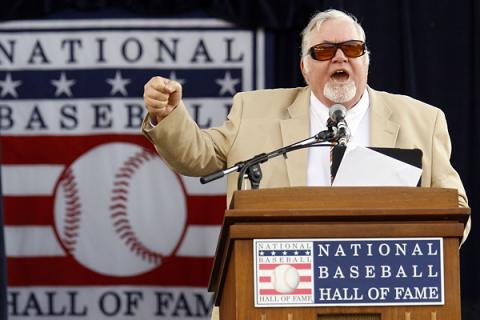Abuse Allegations Come to the Hall of Fame
We're used to scandals about athletes, but should sportswriter Bill Conlin be allowed to stay in Cooperstown?
It was fairly common that when I went to eat at Villa Gallace restaurant during spring training in Clearwater, Fla., I would run into Bill Conlin, the baseball columnist for the Philadelphia Daily News. Long before I joined the Philadelphia Phillies as a player with a team he covered very closely, I would know his work, his name. He spared no one from his wide-ranging critiques. Luckily, I was exempted from his harshest words in part because I happened to be his late wife’s favorite player.
So when I heard about the allegations against him — that he molested a group of young girls and a boy (including his niece who came forward over the holidays) — I was certainly appalled and caught off guard. A controversy is now brewing about whether his award for journalistic excellence given to him by the Baseball Hall of Fame in 2011 should be revoked and Conlin stripped of his place in Cooperstown. Character matters, it is argued, and I agree. Yet as it pertains to the award, it isn’t that simple.
The Hall of Fame enshrines people who have shown excellence in the craft in or in support of the game. In fact, they outline it for players on their website by stating, ”Voting shall be based upon the player’s record, playing ability, integrity, sportsmanship, character, and contributions to the team(s) on which the player played.” Despite my disgust for Hall of Famer Ty Cobb and his racism, he should be in Cooperstown based on that definition. Even though I grew up a Phillies fan, I have always come down against Pete Rose’s enshrinement because his act of gambling on the game ran against the integrity of the game directly. Ty Cobb made himself look ridiculous from his worldview, which he is entitled to have, Pete Rose made the game look ridiculous and trivial, which is bigger than his individual transgressions. Big difference.
For the same reason, I don’t think that players who used steroids should be in the hall. However, the challenge with steroids is that the game did not ban forbid them for most of the period when they were being used, so whatever players were taking may have been illegal, but not contrary to baseball law. So far, for people already enshrined, the Hall has decided to have a disclaimer that basically says “These players played in the Steroid Era so therefore take it with a grain of salt.” It’s probably the best they can do without full evidence, but some other record-breaking players who would perhaps earn a place in the Hall have admitted to using performance enhancing drugs or been proven guilty. To me, that is reason to ban those players should Cooperstown call them in the future. In Conlin’s case, we also have to grapple with the legal presumption of innocence until proven guilty. Maybe Conlin is guilty, which would be horrible. But it may be a long time until that can be proven.
Here is what the Hall says about Conlin’s award. The J.G. Taylor Spink Award honors a baseball writer (or writers) “for meritorious contributions to baseball writing.” That definition is broad enough to argue against yanking an award even in the face of drug charges, abuse allegations, and other. His contributions were meritorious, his behavior may not have been. He was a great writer who may have hurt many young people, unfortunately. If he is convicted, that will stick to him and the least of his concerns will be a plaque.
It comes down to asking a different question while remembering that most awards are only just that, awards. Made of parts of metal, plastic, or paper; they sometimes even end up in garbage cans and pawn shops. They also have flaws, weaknesses and are as human as the voters who are just voting by the parameters and the information in front of them at the time when they voted.
But if we care about character, then we should fight for making sure it is part of the criteria in the first place. In the case when an athlete taints the criteria directly by cheating, then that is fair game to revoke an award, but it has to be within the confines and timeline of its definition. Whether we agree with the criteria is a different story. If we don’t, then it is up to us to do something about it. And when it comes to the severity of some of these awful crimes on children swirling around sports these days, it is a good time to challenge our criteria for just about everything.
TIME January 11, 2012






